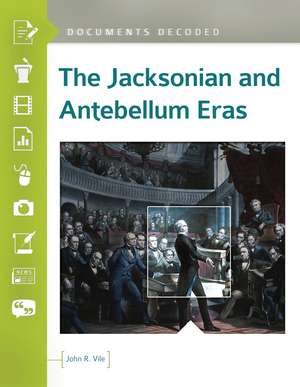The Jacksonian and Antebellum Eras: Documents Decoded: Documents Decoded
Autor John R. Vileen Limba Engleză Hardback – 13 noi 2016 – vârsta până la 17 ani
Din seria Documents Decoded
- 47%
 Preț: 377.48 lei
Preț: 377.48 lei - 47%
 Preț: 377.18 lei
Preț: 377.18 lei - 47%
 Preț: 374.82 lei
Preț: 374.82 lei - 48%
 Preț: 370.53 lei
Preț: 370.53 lei - 47%
 Preț: 374.82 lei
Preț: 374.82 lei - 43%
 Preț: 362.95 lei
Preț: 362.95 lei - 47%
 Preț: 388.50 lei
Preț: 388.50 lei - 41%
 Preț: 388.01 lei
Preț: 388.01 lei - 47%
 Preț: 354.85 lei
Preț: 354.85 lei - 42%
 Preț: 349.94 lei
Preț: 349.94 lei - 42%
 Preț: 350.81 lei
Preț: 350.81 lei - 47%
 Preț: 386.60 lei
Preț: 386.60 lei - 51%
 Preț: 361.68 lei
Preț: 361.68 lei - 47%
 Preț: 391.34 lei
Preț: 391.34 lei - 47%
 Preț: 378.13 lei
Preț: 378.13 lei
Preț: 385.65 lei
Preț vechi: 732.61 lei
-47% Nou
Puncte Express: 578
Preț estimativ în valută:
73.84€ • 76.89$ • 61.26£
73.84€ • 76.89$ • 61.26£
Carte tipărită la comandă
Livrare economică 12-26 februarie
Preluare comenzi: 021 569.72.76
Specificații
ISBN-13: 9781440849817
ISBN-10: 1440849811
Pagini: 296
Dimensiuni: 216 x 279 x 25 mm
Greutate: 1.09 kg
Editura: Bloomsbury Publishing
Colecția ABC-CLIO
Seria Documents Decoded
Locul publicării:New York, United States
ISBN-10: 1440849811
Pagini: 296
Dimensiuni: 216 x 279 x 25 mm
Greutate: 1.09 kg
Editura: Bloomsbury Publishing
Colecția ABC-CLIO
Seria Documents Decoded
Locul publicării:New York, United States
Caracteristici
Supplies historical context for explaining the causes and effects of American westward expansionism, especially as they related to slavery
Notă biografică
John R. Vile, PhD, is professor of political science and dean of the University Honors College at Middle Tennessee State University.
Cuprins
Introduction to the Antebellum PeriodSECTION 1: THE JACKSON YEARSA Strict and Faithful EconomyAndrew Jackson's First Inaugural Address (March 4, 1829)Benevolence or HumanityCatharine Beecher's Circular Letter (December 1, 1829)The South Carolina DoctrineRobert Hayne's Second Speech on Foot's Resolution (January 21, 1830)Liberty and UnionDaniel Webster's Second Speech on Foot's Resolution (January 26-27, 1830)Our Federal UnionJackson and Calhoun Exchange Toasts (April 13, 1830)Doubtless It Will Be PainfulAndrew Jackson's Speech to Congress on Indian Removal (December 6, 1830)Domestic Dependent NationsCherokee Nation v. Georgia (1831)Harsh as Truth, and Uncompromising as JusticeWilliam Lloyd Garrison's Editorial in the Liberator (1831)Mere PrecedentAndrew Jackson's Veto of the National Bank Renewal (July 10, 1832)Null, Void, and No LawSouth Carolina's Ordinance of Nullification (November 24, 1832)Unlawful Obstructions, Combinations, or AssemblagesThe Force Bill (March 2, 1833)Not for the Government of the Individual StatesBarron v. Baltimore (1833)Power Not Conferred by the ConstitutionSenate Resolution Censuring Andrew Jackson (March 28, 1834)The Union of the StatesJames Madison's Advice to My Country (1834)A Free, Sovereign, and Independent RepublicTexas Declaration of Independence (March 1836)This People Have Become CivilizedMemorial and Protest of the Cherokee Nation (June 22, 1836)Shall . . . Be Laid Upon the TableGag Rule Adopted by the House of Representatives (Pinckney Resolution) (1836)SECTION 2 YEARS OF EXPANSION, NASCENT REFORM, AND MANIFEST DESTINYThe Power and Influence of the RepublicMartin Van Buren's Inaugural Address (March 4, 1837)There Is No Exclusive PrivilegeCharles River Bridge Co. v. Warren Bridge Company (1837)Reverence for the LawsAbraham Lincoln's Address Before the Young Men's Lyceum of Springfield (January 27, 1838)Let My People Go!"Go Down Moses" Folk Song (1840s)An Army of OfficeholdersJohn Tyler's Initial Presidential Speech (April 9, 1841)The Just Rights of the Owner to Reclaim His SlavePrigg v. Pennsylvania (1842)One Law for All SoulsMargaret Fuller's The Great Lawsuit (July 1843)The Fulfillment of Our Manifest DestinyJohn O'Sullivan's "Annexation" (July-August 1845)The Fatal Poison of Irresponsible PowerFrederick Douglass's Narrative of the Life of Frederick Douglass (1845)To Provide for the DefenseJames K. Polk's Call for a Declaration of War Against Mexico (May 11, 1846)Neither Slavery nor Involuntary ServitudeThe Wilmot Proviso (1846)Being in the WrongLincoln's Speech in Congress Against the War with Mexico (January 12, 1848)All Men and Women Are Created EqualDeclaration of Sentiments, Seneca Falls Convention (July 19-20, 1848)Why Has Every Man a Conscience, Then?Henry David Thoreau's Civil Disobedience (1849)SECTION 3 PRELUDE TO IRREPRESSIBLE CONFLICTThe Peace, Concord, and Harmony of the UnionCompromise of 1850 (January 29, 1850)The Concurrent, or Constitutional MajorityJohn C. Calhoun's A Disquisition on Government (1850)Slavery Exists . . . Independent of the ConstitutionResolutions of the Nashville Convention (1850)The Power to Regulate Commerce, Embraces a Vast FieldCooley v. Board of Wardens of Port of Philadelphia (1851)Ain't I a Woman?Sojourner Truth's Speech at a Women's Convention (1851)The Immeasurable Distance between UsFrederick Douglass's "What to the Slave Is the Fourth of July?" (1852)To Be Sold Separately, or in LotsHarriet Beecher Stowe's Uncle Tom's Cabin (1852)As Their Constitution May PrescribeThe Kansas-Nebraska Act (May 30, 1854)He Is But a Grown Up ChildGeorge Fitzhugh's Sociology for the South (1854)Degrading Classes of White PeopleAbraham Lincoln's Letter on the Know-Nothing Party (August 24, 1855)Regulating ImmigrationKnow-Nothing Party Platform (1855)[Not] Acknowledged as Part of the PeopleDred Scott v. Sandford (1857)No Co-operation with Slaveholders in PoliticsHinton Rowan Helper's The Impending Crisis of the South (1857)A House Divided Against ItselfAbraham Lincoln's Speech at the Republican Convention (June 16, 1858)The Exclusive Right of a Free PeopleStephen A. Douglas's Response to Lincoln (July 9, 1858)Prior to the Formation of a State ConstitutionThe Second Lincoln/Douglas Debate (August 27, 1858)The Principles Promulgated in the Declaration of IndependenceRepublican Party Platform of 1860 (May 17, 1860)Equal Justice to All SectionsThe Crittenden Compromise (December 18, 1860)Not Enemies, but FriendsLincoln's First Inaugural Address (March 4, 1861)These Ideas [of Human Equality] Were Fundamentally WrongAlexander H. Stephens's Cornerstone Speech (March 21, 1861)The Domestic InstitutionsThe Proposed Corwin Amendment (March 1861)Timeline of EventsFurther ReadingIndex
Recenzii
This is a useful reference that will prove an excellent acquisition for libraries serving high school students and undergraduates.
Summing Up: Recommended. High school, community college, and undergraduate students; general readers.
Summing Up: Recommended. High school, community college, and undergraduate students; general readers.
